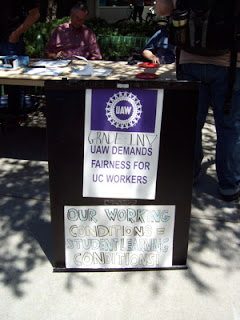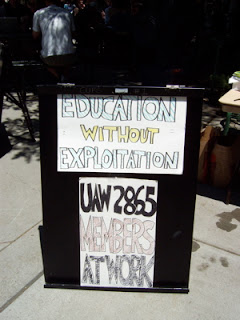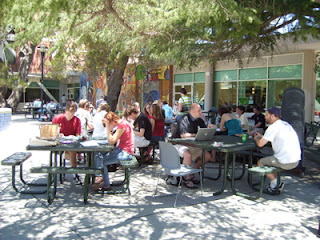What began in Alameda last month is now beginning to spread around the state. As their future is taken from them by a Yacht Party determined to protect wealth and aristocracy through crippling education cuts, California students are beginning to fight back. In rallies that are unfolding across the state, they are speaking out for opportunity, for education, for democracy.
And on April 18 and April 21, they are poised to make the loudest statement yet against the destruction of education in California.
More on that below. But first, how is Arnold responding to the crisis in public education? The governor, whose own children attend private schools, made a fundraising visit to St. Margaret’s Episcopal School in San Juan Capistrano yesterday at the request of Mimi Walters, GOP assemblywoman and parent of two St. Margaret’s students. He was met by over 200 protestors who denounced Arnold’s education cuts:
Chanting “Save our schools” and “Shame on you,” about 200 teachers, students and parents from across South County lined the narrow sidewalks in front of a Mexican restaurant Thursday afternoon, protesting Arnold Schwarzenegger’s proposed education cuts as the governor rolled up for a fundraiser.
Sheriff’s deputies on foot and motorcycle ordered protesters to stay off the private driveway of El Adobe de Capistrano restaurant in the moments leading up to the governor’s 6:15 p.m. arrival. Schwarzenegger entered the downtown San Juan Capistrano eatery through a side entrance and did not address the protesters.
Schwarzenegger’s communications director, Matt David, told reporters the governor “wishes he could be outside with these protesters” and that he applauded their efforts.
“This is the last thing he wants to do,” said David, explaining that the governor hoped to work with lawmakers to find a different solution to the state’s budget crisis. “He understands how important it is to fund education.”
Of course, nobody forced Arnold to propose a $4 billion cut to K-12 funding. And he can reverse those cuts in his May revise. But he will get his chance to join these protestors over the next week, as California students are about to unleash an unprecedented wave of activism to stop Arnold and his attacks on public education.
The tone was set earlier this week at Mission Viejo High School, where 4,000 people rallied to oppose the education cuts:
Tuesday’s rally – one in a series of protests that have been staged on street corners and at Orange County schools in recent weeks – was primarily intended to give students an opportunity voice their views on the budget crisis in front of a microphone. The one-hour event was spearheaded by the Saddleback Valley Inter-Council of Students, a group of 21 student leaders from the district’s five high schools.
“Budget cuts should not punish students and the future of this state,” Kaitlyn Spore, student representative to the district Board of Education and a Mission Viejo High senior, told the crowd. “It is our hope that we can send a strong message to the governor that education must be a priority.”
These protests are about to get much larger. Two coalitions are organizing statewide protest actions next week – K-12 students will rally in Sacramento and across the state on April 18, and college students will do the same on April 21.
The April 18 Day of Action is being called Right to Learn and is organized by Youth Noise, a group that has been working to organize young Californians around a variety of issues. Trey Csar, the coordinator of the Right to Learn Day of Action, told me that their goal is to empower students to become activists, not just on April 18 but over the long-term period. The rallies are designed to mobilize students and build coalitions that can survive over the coming months, especially the summer break.
Right to Learn is modeling itself on the successful Step It Up climate action movement. Crowdsourcing is the driving principle, where students at high schools across the state will initiate activism, plan their own actions, and use the internet to share their experiences with other students across the state.
Alongside the April 18 movement, Students for California is organizing several mass rallies around the state on April 21, centered on a protest march in Sacramento from Raley Field to the State Capitol. There will also be marches in Santa Barbara, LA, Riverside, San Diego, and even Arcata. Josh Franco, who is coordinating the April 21 events, told me that his model is the immigrant rights protests from spring 2006 – a large display of student power, it is hoped, will spark political awareness among other students and show state legislators the depth of public anger at the proposed cuts.
If the Republicans are going to be broken, and if a 2/3 vote for a sane and responsible budget that doesn’t cut education is going to be attained, it will take public activism of this sort. California’s students are not going to take the destruction of their future quietly. Let’s hope their activism next week is a success, and that it is but the beginning of a statewide, mass movement to reverse these cuts.





